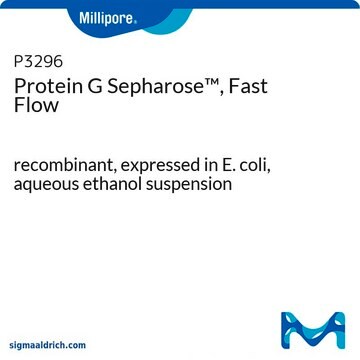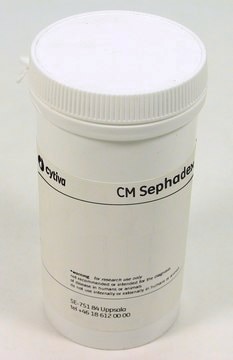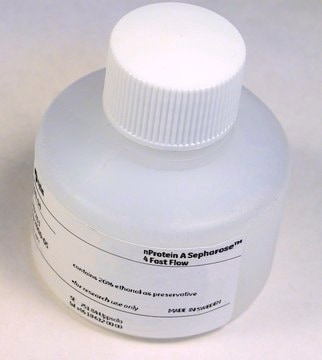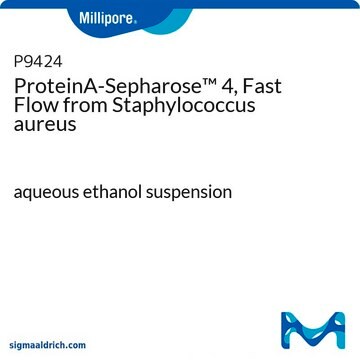GE17-0618-05
Protein G Sepharose™ 4 Fast Flow
Cytiva 17-0618-05, pack of 200 mL
Sinónimos:
Fast Flow resin, Antibody purification resin, IgG purification resin
About This Item
Productos recomendados
ligand
recombinant protein G lacking albumin-binding region
packaging
pack of 200 mL
manufacturer/tradename
Cytiva 17-0618-05
storage condition
(20% Ehtanol)
matrix
4% cross-linked agarose
average diameter
90 μm (d50v)
cleaning in place
2-10
working range
3-9
suitability
suitable for bioprocess medium
storage temp.
2-8°C
General description
Protein G Sepharose™ 4 Fast Flow has recombinant protein G immobilized by the cyanogen bromide (CNBr) method to Sepharose™ 4 Fast Flow. Protein G exhibit binding specificities that complement Protein A media and binds to the Fc region of IgG from a variety of mammalian species. Protein G Sepharose™ 4 Fast Flow may be used to isolate and purify classes, subclasses and fragments of immunoglobulins from any biological fluid or cell culture medium.
As member of the BioProcess media range, Protein G Sepharose™ 4 Fast Flow meets industrial demands with security of supply and comprehensive technical and regulatory support.
Features and Benefits
- Binding specificities that complement Protein A media.
- Binds a broad range of IgG species and subclasses.
- Multi-point attachment minimizes ligand leakage.
- Used in a range of research applications.
Storage and Stability
Analysis Note
Legal Information
signalword
Warning
hcodes
Storage Class
3 - Flammable liquids
Certificados de análisis (COA)
Busque Certificados de análisis (COA) introduciendo el número de lote del producto. Los números de lote se encuentran en la etiqueta del producto después de las palabras «Lot» o «Batch»
¿Ya tiene este producto?
Encuentre la documentación para los productos que ha comprado recientemente en la Biblioteca de documentos.
Los clientes también vieron
Artículos
Purify monoclonal or polyclonal IgG from serum, cell culture supernatant or ascitic fluid using the HiTrap Protein G HP from Cytiva, an affinity-exclusion chromatography product containing Sepharose-immobilized Protein G.
This page describes immunoprecipitation (immunoaffinity or pull-down techniques).
This page describes efficient column packing and preparation for affinity chromatography of antibodies.
This page shows how to convert between flow velocity and volumetric flow rate in affinity chromatography of antibodies.
Protocolos
This page provides information about different pull-down assays for the further isolation of multiprotein complexes to identify their components with products from Cytiva.
This page shows how to separate IgG antibodies by affinity chromatography using Protein G Sepharose 4 Fast Flow from Cytiva.
This page shows how to prepare samples for purification with affinity chromatography.
Nuestro equipo de científicos tiene experiencia en todas las áreas de investigación: Ciencias de la vida, Ciencia de los materiales, Síntesis química, Cromatografía, Analítica y muchas otras.
Póngase en contacto con el Servicio técnico










